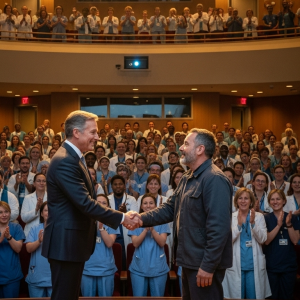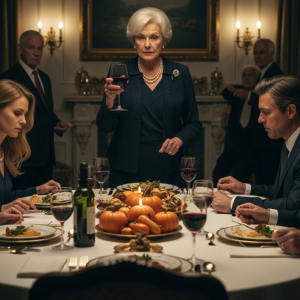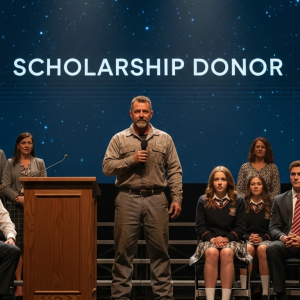The world, for Eleanor Vance, had a particular scent: the dry, sweet perfume of aging paper, the faint, earthy aroma of leather bindings, and the sharp, metallic tang of old ink. For thirty years, she had been a librarian at the city university, a quiet custodian of public knowledge. But her true sanctuary was a place few had ever entered: the private, labyrinthine library of Mr. Alistair Blackwood.
Her weekends were not spent in brunch cafes or shopping malls, but lost in the hushed, dusty aisles of Blackwood’s mansion. It wasn’t a job. It was a communion. He was a reclusive collector, a man who had turned his back on the modern world to curate a fortress of history. Together, they would spend hours hunched over illuminated manuscripts, their fingers tracing the delicate calligraphy of monks long dead, their voices low as they debated the nuances of a forgotten poet or the authenticity of a disputed historical text.
“They build towers of glass and steel to house men who trade in imaginary numbers,” Blackwood rasped one Saturday afternoon, his gnarled hand hovering over a first-edition copy of Milton’s Paradise Lost. “But the real wealth, Eleanor, the only true currency, is this. The accumulated thought of a thousand lifetimes. And you… you are the only person I know who isn’t bankrupt.”
Eleanor smiled, her fingers gently cleaning the spine of the book. “I’m just a librarian, Alistair.”
“Nonsense,” he grumbled, his sharp eyes fixing on her. “You are a guardian. Don’t ever let anyone tell you otherwise.” He had a particular disdain for her family, whom he had met only once. He found her husband pleasant but dull, and her daughter, Sophie, unbearable. “A hollow head full of brand names,” he had muttered to Eleanor after their one and only encounter. “She looks at a book and only sees a decoration.”
Eleanor never defended Sophie’s worldview, but a quiet ache always settled in her heart when Alistair’s words echoed her own deepest fears. She saw the chasm that had opened between her and her daughter, a valley carved by ambition and filled with the noise of a world she no longer understood.
Sophie Vance’s world smelled of expensive perfume, freshly printed PowerPoint slides, and the faint, ozonic hum of new technology. Her sanctuary was the gleaming, minimalist lecture hall of the university’s prestigious MBA program. Here, the language was not of poetry, but of profit margins; not of history, but of hostile takeovers. Value was not measured in wisdom, but in dollars, and success was a meticulously plotted graph trending ever upward.
She was a star student, charismatic and fiercely intelligent. She moved through the world with a polished confidence that bordered on arrogance, networking with a precision that was both admirable and chilling. Her mother’s profession was a source of deep, private shame, a quaint and dusty relic in her chrome-plated life.
The university was buzzing with news of the planned “Blackwood Business Pavilion,” a state-of-the-art new building to be funded by a colossal donation from the reclusive philanthropist. Sophie saw this as a sign, a convergence of her world and the strange, dusty world her mother occasionally visited.
“It’s a game-changer,” she explained to her friends over cocktails at a rooftop bar, the city lights glittering below them. “The Blackwood name will attract top-tier recruiters from around the globe. This isn’t just a building; it’s a brand. And I am going to be part of its inaugural class.” Her friends, all cast from the same ambitious mold, murmured in agreement.
“Who is this Blackwood guy, anyway?” one of them asked. “Isn’t he that weird old hermit your mom works for sometimes?”
Sophie’s smile tightened for a fraction of a second. “She doesn’t work for him. She helps him organize his old books. It’s… a hobby. A charity case, really.” The lie came easily, a well-practiced defense against the perceived stain of her mother’s quiet, unprofitable life. She loved her mother, she told herself, but she could not, would not, allow that quiet life to cast a shadow on her own brilliant future.
The dinner was meant to be a celebration of Sophie’s acceptance into a prestigious summer internship program. But like most family gatherings, it had become a stage for Sophie’s ambition, with Eleanor cast as a silent, background character. They were at an expensive, minimalist restaurant where the plates were large and the portions were small.
Sophie was holding court, regaling her friends and a few distant relatives with tales of her corporate strategy class, name-dropping professors and future CEOs. Eleanor sat beside her, a quiet island in her daughter’s sea of noise, occasionally offering a polite smile.
A well-meaning cousin turned to Eleanor. “It must be so wonderful for you, Eleanor, seeing Sophie achieve so much. What have you been up to lately? Still at the library?”
Before Eleanor could answer, Sophie let out a light, dismissive laugh. “Oh, Mom’s always at the library,” she said, her voice carrying across the table. She turned to her friends, a conspiratorial glint in her eye. “My mother? She’s a wonderful woman. Truly. The sweetest person you’ll ever meet.”
She paused, taking a sip of her wine, ensuring she had everyone’s attention. “But ambition? Not a single drop in her veins. She’s happy in her little world of dusty books. A failure, if we’re being brutally honest. But a happy one, I suppose.”
The words, though delivered with a smile, were a quiet assassination. They landed in the sudden silence of the table with the force of a physical blow. A few people shifted uncomfortably in their seats. Eleanor felt the familiar heat of shame rise in her cheeks, but her expression remained serene. She simply picked up her fork, took a small bite of her fish, and offered her daughter a sad, knowing smile that Sophie refused to meet. In that moment of public dismissal, Eleanor didn’t see a successful daughter; she saw a lost child, blinded by the glare of a world that taught her the price of everything and the value of nothing.
A week later, Mr. Blackwood passed away peacefully in his sleep. Eleanor mourned the loss of her only true intellectual peer, a friend who saw her not as a failure, but as a guardian. The following week, she received a call from a downtown law firm. She had been named in Mr. Blackwood’s will.
The law office of Covington & Strathmore was a cathedral of quiet, old money. The air was thick with the scent of leather and lemon polish. Eleanor sat on a plush Chesterfield sofa, feeling decidedly out of place in her simple dress. Across from her were Alistair Blackwood’s distant relatives—a sour-faced nephew and his grasping wife, a handful of cousins he hadn’t seen in decades. They buzzed with greedy anticipation, their dark suits a stark contrast to their bright, hopeful eyes.
Mr. Covington, a lawyer whose face seemed to be carved from granite, cleared his throat and began to read the last will and testament of Alistair Blackwood. The legalese was dense, but the initial bequests were simple. Minor artifacts and modest sums of money were distributed among the relatives, who accepted their envelopes with poorly concealed disappointment.
Then, Mr. Covington paused. He adjusted his spectacles, took a sip of water, and looked directly at Eleanor. “We now come to the primary articles of the estate,” he said, his voice resonating in the tense silence. “Article IV: My entire collection of rare books, manuscripts, incunabula, and historical documents, I bequeath in its entirety to my dear friend and trusted intellectual confidante, Mrs. Eleanor Vance.”
A gasp went through the room. The sour-faced nephew started to rise from his chair, his face turning a blotchy red.
Mr. Covington held up a hand. “Please, there is more.” He continued reading. “Article V: All the rest and residue of my estate, including all properties, stocks, bonds, and liquid assets, valued at the time of this writing in the excess of eighty million dollars, I also leave, in its entirety and without condition, to the aforementioned Mrs. Eleanor Vance. She was the sole guardian of my life’s work in my lifetime, and she shall be its sole proprietor in my death.”
The room erupted. The nephew began shouting about undue influence, his wife burst into tears. But Eleanor heard nothing. Eighty million dollars. The number was abstract, impossible. It was a weight, a responsibility that made her dizzy.
But the final shockwave was yet to come.
“Finally,” Mr. Covington said, his voice rising above the din, “there is an addendum, signed by Mr. Blackwood just last month. It concerns his previously pledged philanthropic gift to the university.” He looked around the room. “The pledge of fifty million dollars to fund the construction of the new Blackwood Business Pavilion is hereby revoked.”
He let the words hang in the air before delivering the final, devastating blow. “In its place, that sum is to be allocated to a new endowment, to be administered by Mrs. Vance, for the express purpose of founding and perpetually funding a new institution at the university: The Eleanor Vance Center for Ancient Texts and Manuscript Studies.”
Sophie was in the middle of a lecture on venture capital when her laptop pinged. It was an email from the Dean of the Business School. The subject line was stark: “An Important Announcement Regarding the Blackwood Pavilion.”
Annoyed at the interruption, she opened it. Her eyes scanned the text, her confident posture slowly deflating.
“Dear Students and Faculty,” it began. “It is with great regret that I must inform you that the planned construction of the Blackwood Business Pavilion has been canceled indefinitely. Due to a last-minute, irrevocable change to the will of our esteemed benefactor, the funds pledged for this project have been… redirected.”
Sophie’s breath caught in her throat. Redirected?
“While we are deeply disappointed by this turn of events, the university is also profoundly grateful to the late Mr. Blackwood for his revised gift: an unprecedented endowment to establish a world-class humanities research center. I am sure we will all join in congratulating the founding director of this new and exciting institution, a long-serving and respected member of our university community, Mrs. Eleanor Vance…”
The rest of the words blurred into an incoherent jumble. Eleanor Vance. Her mother. The “failure.” The name of the new center. It wasn’t a coincidence. It was a declaration. A quiet, bookish woman had just single-handedly obliterated the glittering future of the entire business school. Her mother hadn’t just inherited a fortune; she had inherited the power to reshape the university’s legacy, and in doing so, had vaporized the very foundation of Sophie’s world.
A wave of nausea washed over her. Her classmates began to whisper, their phones lighting up with the same email. A few of them glanced at her, their expressions a mixture of confusion and pity. In that moment, sitting in the heart of her kingdom, Sophie had never felt so small, so utterly and profoundly foolish. The mother she had pitied had just become the most powerful woman on campus, and the ambition she had worshipped had been rendered meaningless by a pile of old, dusty books.
The days that followed were a masterclass in humiliation for Sophie. The universe she had so carefully constructed, where value was determined by stock performance and networking prowess, had been turned upside down. The “useless” humanities, which she and her peers had always dismissed as a quaint academic backwater, were now the talk of the university.
Her professors, men and women she had revered for their corporate acumen, were now openly grumbling about the cancelled project. One of them, a charismatic marketing guru she idolized, unknowingly twisted the knife during a class discussion.
“While the loss of the Blackwood Pavilion is a blow,” he said, addressing the class, “we must acknowledge the sheer power of this new Vance Center. The prestige it will bring to the university is immense. The director, Mrs. Vance, is now one of the most significant patrons of the arts and humanities in the country. A true intellectual force.” He said the name without a hint of recognition, but Sophie felt it like a brand on her skin.
Her social standing, built on the promise of future success, crumbled. Her friends, who had orbited her ambition, now seemed distant. The world had seen her as the daughter of a simple librarian. Now, it saw her as the daughter of a titan of academia, and her own accomplishments seemed petty and insignificant in comparison. The shame was a constant, suffocating presence. She had called her mother a failure in a room full of people. Now, she was the failure, exposed for her shallowness, her ignorance, and her profound lack of gratitude.
Eleanor, meanwhile, moved through her new reality with the same quiet grace she had always possessed. The money hadn’t changed her; it had merely given her the tools to enact the vision she had shared with Alistair. She met with architects not to design a monument to commerce, but a sanctuary for scholarship. She interviewed candidates for research grants, her eyes lighting up as young, brilliant minds spoke of their passion for forgotten languages and fragile histories.
She did not revel in her daughter’s downfall. In fact, she felt a deep and abiding sorrow for her. She had given Sophie every advantage, but had somehow failed to impart the one thing that truly mattered: the understanding that a life’s value cannot be listed on a stock exchange.
Part 7: The Apprentice in the Archives
Three months passed. The temporary home of the Eleanor Vance Center was established in a beautifully restored wing of the main library—Eleanor’s old stomping grounds. The collection had been moved, and scholars from around the world were already applying for access.
One afternoon, as Eleanor was overseeing the delicate process of digitizing a 14th-century manuscript, there was a hesitant knock on her office door. It was Sophie.
She looked different. The polished, confident veneer was gone. She was dressed simply, her hair was pulled back, and her eyes were shadowed with a humility Eleanor had never seen before. She didn’t look at Eleanor’s face, but at her hands.
“Mom,” she began, her voice barely a whisper. “I… I came to apologize. What I said at that dinner… and what I’ve thought for years… it was arrogant, and ignorant, and cruel. I was wrong. About everything.” Tears welled in her eyes, but she fought them back.
“I don’t want your money,” she continued, finally meeting Eleanor’s gaze. “I don’t deserve it. But I am asking for… a job. I want to learn. I want to understand what it is you do. What he saw in you. I want to understand the value of… all this.” She gestured vaguely at the shelves of ancient books that lined the office.
Eleanor studied her daughter for a long moment. She saw the raw, painful sincerity in her eyes. This wasn’t a trick. It was a plea for redemption. Her maternal heart ached with a love that transcended all the hurt.
“The work is difficult,” Eleanor said, her voice soft but firm. “The pay is minimal. You’ll start in the sub-level archives. Your primary job will be cataloging and dust control. You won’t be networking with CEOs. You’ll be spending your days with the silent dead.”
“I’ll do it,” Sophie said without hesitation.
Eleanor nodded slowly. “Alright, Sophie. Your training begins tomorrow at eight a.m. Don’t be late.”
The next morning, Eleanor walked through the climate-controlled vaults in the library’s basement. In the corner, surrounded by towering stacks of forgotten texts, was her daughter. Her expensive manicure was already smudged with dust. She was bent over a large, leather-bound ledger, her brow furrowed in concentration, carefully transcribing its contents. She was starting over.
Eleanor watched her for a moment, unseen. Their relationship was not healed, not yet. But for the first time in many years, it was real. A new foundation was being laid, page by dusty page, built not on the shifting sands of commerce, but on the enduring bedrock of knowledge, humility, and a hard-won, newfound respect.




